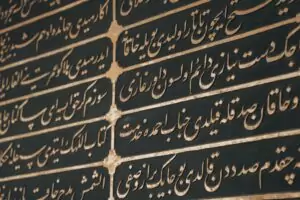In Arab culture, names are not merely labels; they are a reflection of identity, heritage, and belief. The process of naming a child is a thoughtful one, as it is believed that the name shapes a person’s destiny and character. This is why Arabic names carry such profound meanings and are chosen with care.

✅ AI Essay Writer ✅ AI Detector ✅ Plagchecker ✅ Paraphraser
✅ Summarizer ✅ Citation Generator
Arabic names are known for their unique structure and rich meanings. They often consist of five parts and reflect the cultural and religious background of the individual. In this article, we will explore the different components of Arabic names and their significance. We will also provide a comprehensive list of Arabic names with their meanings to help you choose the perfect name for your child.
How Do Arab People Name Their Children?
Before diving into the world of Arabic names, it’s important to understand how Arab people traditionally name their children. Each child is given a first name, followed by their father’s name, their grandfather’s name, and then their family or tribe’s name. The meaning of the name holds great significance in Arab culture. It is believed that the name can influence a person’s personality and destiny, so it must be chosen thoughtfully.
In Arabic, the word for a name is “اسم” (asm), and Arabic names originate from Arab countries in the Middle East, such as Saudi Arabia, Morocco, Syria, Egypt, and more. Many of these names have been inspired by Islam and the Islamic world. Some even have their roots in the Quran and carry immense religious significance. One such name is “Prophet Muhammad,” which is commonly found in the names of Muslim boys.
However, it’s important to note that in Islam, the word for God is “Allah,” and this name is so sacred that it cannot be used to name a child. There are variations like “Abdullah” (meaning “Allah’s servant”) and “Samiullah,” but the name “Allah” itself is never given to a person.
Arabic history is rich with notable figures who have made a lasting impact on the world. Many of these individuals were named after significant historical events, places, or religious figures. Some of the most well-known Arabic names in history include:
- Muhammad (meaning “praised”)
- Fatima (meaning “one who abstains”)
- Ali (meaning “elevated” or “exalted”)
- Aisha (meaning “living” or “life”)
- Omar (meaning “long-lived” or “flourishing”)
- Khalid (meaning “eternal” or “immortal”)
Arabic names have also had a significant cultural influence, with many non-Arabic cultures adopting Arabic names and naming conventions. For instance, many Muslim families worldwide follow the Arabic naming convention, which includes a given name, a patronymic (father’s name), and a family name.
Moreover, several Arabic names have been embraced by non-Arabic cultures, especially in the West. Names like Aaliyah, Amir, and Fatima have become increasingly popular in recent years, reflecting a growing interest in Arabic culture and history.
3 Common Arabic Names
Now, let’s take a closer look at three common Arabic names and their meanings:
ابراهيم (Ibraheem)
Ibraheem is the Arabic version of the Christian name Abraham. This reflects the similarity between Islam and Christianity. The name Abraham holds a special place in both religions, and it signifies a connection between them.
آزين (Aazeen)
Aazeen is an Arabic name that means beauty. It’s not only a beautiful name but also a very famous one. This name reflects the appreciation of beauty in Arab culture.
حبيب/حبيبة (Habiba/Habib)
Habiba and Habib are widespread names in Arabic, both meaning beloved. These names convey a sense of endearment and affection. In Arabic culture, they are often used to express love and closeness to someone. It’s worth noting that the Holy Prophet Muhammad was also called Habibullah, which means the beloved one of Allah, emphasizing the deep love and respect for the Prophet in Islamic culture.
Popular Arabic Names
Arabic names are known for their rich history and beautiful meanings. They are often chosen for their religious significance or cultural heritage. In this section, we will explore some of the most popular Arabic names for boys, girls, and unisex names. Here’s a list of popular Arabic names along with their meanings:
Popular Arabic Names for Boys
| Name | Meaning |
|---|---|
| Ahmad | Praiseworthy |
| Amir | Prince |
| Farid | Unique |
| Hassan | Handsome |
| Khalil | Friend |
| Malik | King |
| Omar | Long-lived |
| Samir | Entertaining companion |
| Tariq | Morning star |
| Yusuf | God will increase |
Popular Arabic Names for Girls
| Name | Meaning |
|---|---|
| Aisha | Living |
| Fatima | Captivating |
| Hana | Happiness |
| Layla | Night |
| Mariam | Beloved |
| Nour | Light |
| Rania | Queen |
| Sana | Radiance |
| Yasmin | Jasmine |
| Zainab | Fragrant flower |
Popular Unisex Arabic Names
| Name | Meaning |
|---|---|
| Ali | Elevated |
| Amal | Hope |
| Faris | Knight |
| Hasan | Good |
| Inas | Sociable |
| Jaber | Comforter |
| Kareem | Generous |
| Rayan | Watered |
| Salim | Safe |
| Zaki | Pure |
Whether you are looking for a traditional or modern name, Arabic names offer a wide range of options with beautiful meanings. These names not only sound pleasing to the ear but also carry deep cultural and historical significance. When choosing a name for your child, you can consider the meaning and heritage associated with it, making it a special and meaningful choice.
Conclusion
Arabic names are a treasure trove of history, culture, and meaning. They reflect the deep-rooted traditions of the Arab world and the influence of Islam. Whether you’re an Arabic-speaking individual or simply appreciate the beauty of Arabic names, understanding the significance of these names adds a layer of appreciation for their rich heritage.
Whether you choose a common Arabic name or a unique one, you can be sure that it will carry a piece of the rich Arab culture and history with it. Arabic names are more than just words; they are a connection to a heritage that has shaped the world for centuries, and they continue to be a source of beauty, depth, and significance in our diverse and interconnected world. So, if you’re on the hunt for the perfect name for your child, consider the beauty and meaning that Arabic names can bring to their life.
FAQ
Follow us on Reddit for more insights and updates.





Comments (0)
Welcome to A*Help comments!
We’re all about debate and discussion at A*Help.
We value the diverse opinions of users, so you may find points of view that you don’t agree with. And that’s cool. However, there are certain things we’re not OK with: attempts to manipulate our data in any way, for example, or the posting of discriminative, offensive, hateful, or disparaging material.